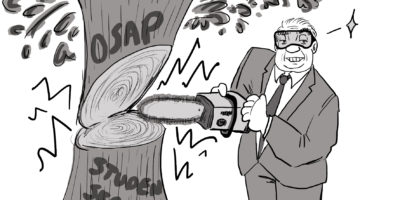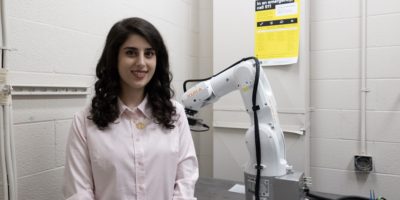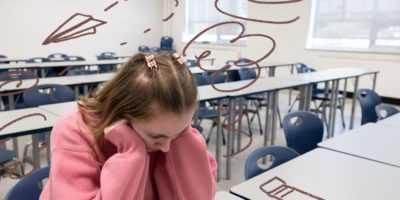by Richard Maerov
Ontario Premier Dalton McGuinty has confirmed that university tuition fees will once again increase next year, ending a two-year provincial tuition freeze.
During a speech at Carleton University last Friday, McGuinty told students the tuition freeze put in place in September 2004 will be lifted and fees will increase for all Ontario post-secondary schools in 2006.
“I know you would like me to promise tuition fees will never go up again and, in an ideal world, I would love to be able to do that but I can’t,” said McGuinty. “I have to live in this world.”
The announcement came as a surprise to members of the Canadian Federation of Students who had been negotiating tuition fees with Ontario government representatives since July. The students had left their last meeting on Sept. 14 believing that the options of continuing the tuition freeze and even reducing fees next year were still on the table.
“We had no idea this was coming,” said Jesse Greener, Ontario Chairperson of the CFS. “All indications to us and to the general public were that a decision on the continuation of the freeze would not be reached before the government had heard all the input from colleges and universities.”
Ryerson Students’ Union Vice-President Education Nora Loreto called the government’s decision “irresponsible,” and said it wasn’t taking the negotiations with students seriously.
“We are extremely concerned that the consultation process has been a sham from the start,” she said.
Following a meeting Monday with Christopher Bentley, the Ontario Minister of Training, Colleges and Universities, CFS said the only options left on the table were a number of ways to increase tuition fees.
“This is hard to swallow,” Greener said.
Bentley said this situation is nothing new. “Our position has been the same for some time. The premier’s comments last week were very similar to ones he made earlier this year.”
It’s not clear how much the Liberals will allow fees to rise and Ryerson President Sheldon Levy did not want to speculate.
“What the premier did not say was how much (the fees) would be going up by and any comment on the regulated and deregulated aspect of it,” Levy said. “So to be fair, until I hear more precision from the government, it’s very hard to comment.”
It has been suggested that new tuition fees will reflect the general inflation rate in the province. Loreto suggested that could amount to a two to three per cent increase.
“I’m deeply concerned that the government is moving away from the thought that education is a social right and more towards a market-based deregulation scheme seen during the government of Mike Harris,” Greener said, adding that tuition fees tripled under the Harris government between 1995 and 2002.
Many Ryerson students are already struggling to pay for tuition. Rabail Bangash, a first-year criminal justice student, is receiving funds from OSAP, but is finding it stressful.
“I’ve had to keep working one day a week during my studies and I just don’t have the time. I will probably have to get two jobs over the summer to help pay off my student loans. I stress more about that than I do about school,” said Bangash.
“It is not our intention to compromise accessibility,” said Bentley. “That’s why we took nearly a quarter of the $6.2 billion promised to post-secondary education and dedicated it specifically to enhance student aid over the next five years.”
Levy insisted that “there has to be financial aid in place to insure that students minds, not students pockets are the access points to post-secondary (education).”
A decision on what tuition will look like is expected in December. In the meantime, the RSU will continue moving forward with the campaign to lower tuition fees in coordination with the CFS.
“It’s important to maintain our lobbying efforts throughout all the Student Federation locals. Our goal is to be the voice of students to our elected representatives. Unfortunately we will be in the shadow of a fee increase for 2006,” said Greener.











Leave a Reply